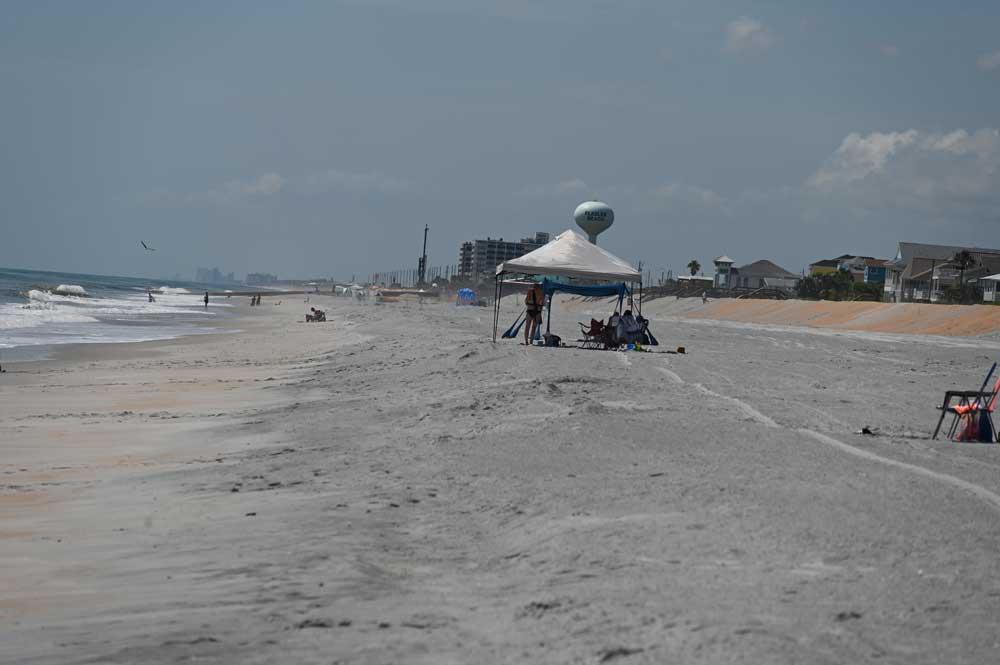
Waterfront property owners have gone to a federal appeals court after a judge last month sided with the Pinellas County town of Redington Beach in a dispute about public beach access.
A notice of appeal, filed Tuesday, does not detail arguments that the group of property owners will make at the 11th U.S. Circuit Court of Appeals. But the property owners are challenging a ruling by U.S. District Judge Virginia Hernandez Covington that said the town had adequately shown a history of “customary use” by the public of parts of the beach that are privately owned.
Covington upheld a 2018 ordinance that sought to protect customary use of what are known as “dry sand areas” of the beach for such activities as walking, sunbathing, fishing and building sand castles.
The waterfront property owners argued that the ordinance was an unconstitutional “taking” of their private property.
“The ordinance does not purport to ‘take’ the portion of dry sand beach in the town owned by plaintiffs,” Covington wrote in the Aug. 12 ruling. “Rather, it purports to recognize and protect the customary use rights of those residents who have gained, through custom, the right to make certain uses of that privately-owned beach.”
Customary use has spurred fights in various parts of the state over the years and drew particular attention in 2018 after Florida lawmakers made controversial changes to customary-use laws. The case would have implications for Flagler County, which passed a “customary use” ordinance in 2018 after elaborate hearings before the County Commission.
The Florida Constitution ensures public access to portions of beaches “below mean high water lines,” often described as wet areas of beaches. But Covington’s ruling, which came in two consolidated lawsuits filed by property owners, dealt with dry-sand portions of beaches closer to homes.
In one of the cases, which were consolidated later, U.S. District Judge James S. Moody in 2020 ruled in favor of waterfront property owners. But a panel of the 11th U.S. Circuit Court of Appeals overturned that ruling in 2021, sending the case back to district court.
The 2018 state law included putting in place an extensive process for local governments that want to have customary-use ordinances, including requiring them to receive judicial approval.
Redington Beach passed its ordinance in June 2018. If local governments adopted ordinances before July 1, 2018, the state law said they could raise customary use as what is known as an “affirmative defense” if the ordinances were challenged in court.
Covington wrote that, under the law, Redington Beach could “keep its ordinance in effect if the court finds that the town’s evidence establishes by a preponderance of the evidence that the town’s residents and visitors have gained, by way of customary use, the right to use the privately-owned portions of the dry sand beach in the town.”
“The court finds that the evidence provided by the town at trial substantially surpassed the quantum of proof necessary to establish its affirmative defense,” she wrote in a conclusion. “Therefore, the court finds that the town has proven the customary use of the privately-owned dry sand beach in the town, and that those uses are consistent with the limited permitted uses set out in the ordinance. Further, the town has proven that this customary use has been by both town residents and those who may visit the town either as vacation renters or guests of residents.”
–Jim Saunders, News Service of Florida





























Robin says
All taxpayers paid for the restoration of Flagler County beaches and should have use of beaches. Set a distance guideline using common sense. Obviously homeowners have the right to a certain amount of privacy.
Celia Pugliese says
They want us to pay for restoration but not let us use it? Crazy…because whether Fema, Corps of Engineer of FDOT grants funds is all our taxes. Since when beaches privatized anywhere?
Mike says
I am fortune enough to live oceanfront across the street from Flagler Beach. Don’t own the beach. As long as folks have good beach fun without disturbing others, have their dog on a leash and all they leave behind are their footprints that’s just fine by me. ☮️
RobdaSlob says
Ditto – actually I get as much pleasure seeing people enjoy the beach as seeing it empty.
Ed P says
Many oceanfront lots extend out several yards beyond the dunes but stop far short of the water. In Flagler county the actual beach area is assumed public. The issue is that beach goers don’t know or understand that they might be walking through or lounging in someone’s front yard. Most homeowners are chill and have just accepted the situation, understanding that it’s a small price to pay for being fortunate enough to live on the beach. Don’t be a hater.
Best advice, stay away from the dunes and be a good neighbor.
Geri K says
In towns where houses are built directly on the beach side, it’s understandable that owners don’t want the public setting up close to their homes. That’s not the case in most of Flagler County, particularly Flagler Beach. Some of those who live on A-1-A across from the beach have ownership rights to the dune across from them, but people enjoying the beach below the dune but above the high tide mark are in no way encroaching on the privacy of the homeowners. I hope no one gets silly about this.